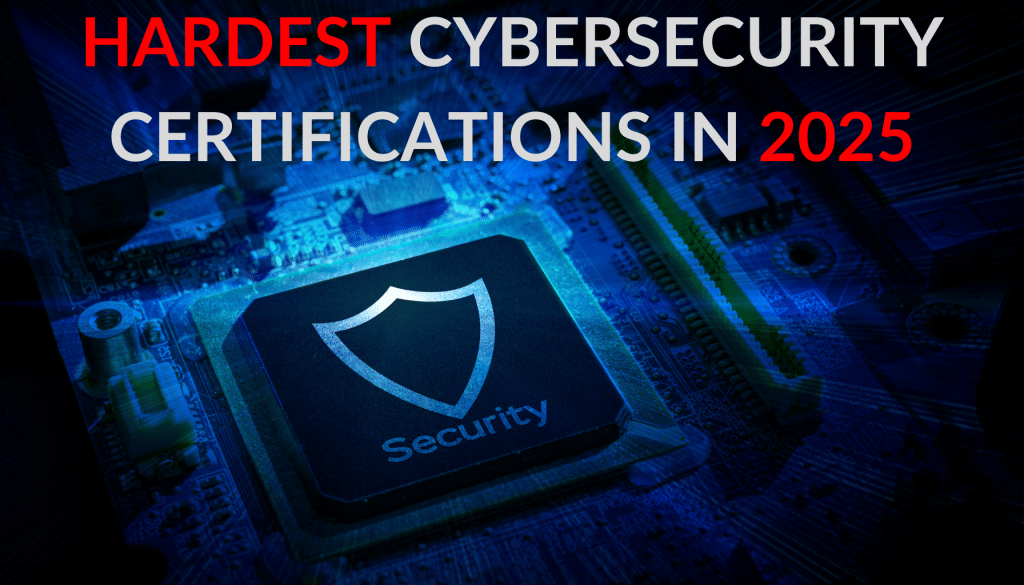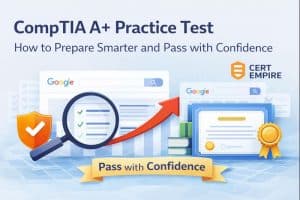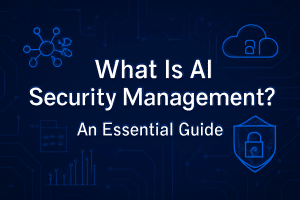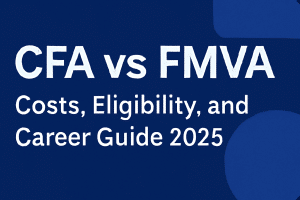Cybersecurity certs aren’t for the faint-hearted. Some of these tests are beasts, and there’s no sugarcoating it. Why? Well, the demand for top-notch security pros is insane right now. With hackers evolving their tricks faster than you can say “malware,” the industry needs people who know their stuff. However, not all cybersecurity certifications are equally challenging. If you’re looking for a more accessible starting point, exploring some of the easiest cybersecurity certifications can be a great way to build your foundation before tackling the harder ones.
No company wants to hand over its network security to someone who doesn’t know the difference between a firewall and a VPN. Certifications like CISSP or OSCP are a way to filter out the crowd and pick the cream of the crop. Employers want to see if you can handle the pressure and solve problems that go beyond textbook answers.
Let’s go through the hardest CyberSecurity certifications and useful tips to passing them like a pro and landing your dream job.
Executive Summary
| Certification | Focus Area | Ideal Candidates | Key Challenges | Benefits |
| CISSP | Security Management and Strategy | Senior security professionals | Broad syllabus with eight domains, scenario-based questions, and a 6-hour endurance test | Globally recognized, opens senior roles (CISO, Security Manager), significant salary boost |
| OSCP | Penetration Testing and Ethical Hacking | Aspiring penetration testers | 24-hour practical exam, no theoretical questions, requires exploiting vulnerabilities and documenting | Demonstrates real-world hacking skills, high demand for red team roles, strong credibility |
| CISA | Auditing and IT Governance | IT auditors, compliance officers | Covers five domains, blends technical and strategic aspects, scenario-based curveball questions | Highly respected, boosts careers in auditing and compliance, recognized globally |
| GSE | Advanced Network Security and Analysis | Experienced security experts | Requires multiple GIAC certs first, written and hands-on lab exams, time-pressured practical challenges | Top-tier recognition, unlocks roles like Security Architect or SOC Director, elite industry respect |
| CEH Practical | Applied Ethical Hacking | Entry to mid-level ethical hackers | Hands-on, 6-hour time-bound test, requires using tools like Metasploit and documenting findings | Proves practical hacking skills, valuable for red teaming and penetration testing, industry-recognized |
The Elite Few: Hardest CyberSecurity Certifications You will Encounter
When it comes to cybersecurity certs, some stand out as legends. These aren’t your average “multiple-choice and move on” type exams. These certs dig deep into your skills, your nerves, and your ability to think on your feet.
Let’s break down the ones that give even seasoned pros a run for their money.
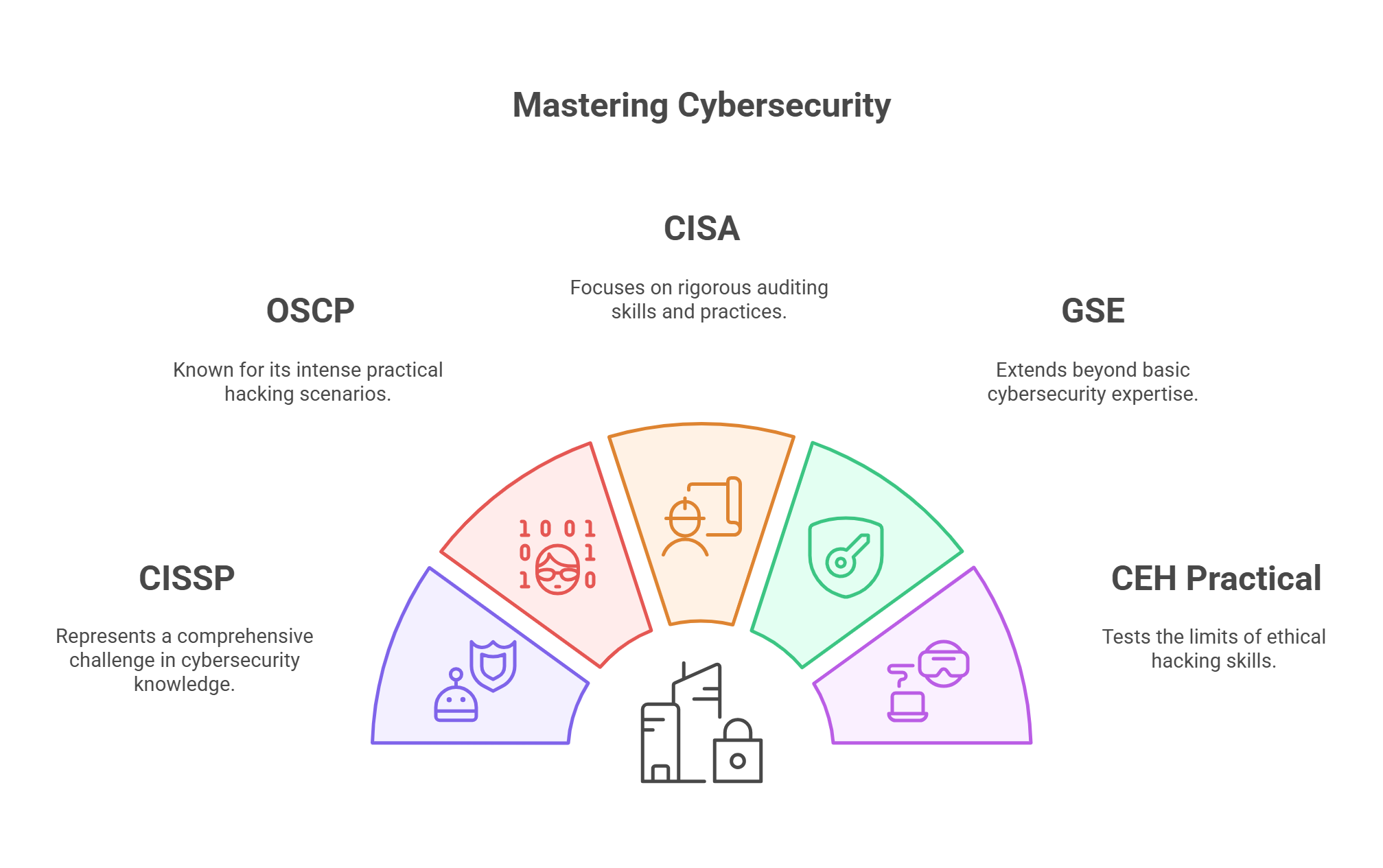
1- Certified Information Systems Security Professional (CISSP): A Comprehensive Challenge
If there’s one cert that screams “serious business” in cybersecurity, it’s CISSP. This isn’t the kind of test you walk into on a whim. It’s a grind, both mentally and emotionally, and it’s designed to separate casual learners from hardcore professionals.
What’s Inside the CISSP Exam?
This test is huge, covering eight domains, and each one is like a mountain on its own. You’re looking at:
- Security and Risk Management
- Asset Security
- Security Architecture and Engineering
- Communication and Network Security
- Identity and Access Management (IAM)
- Security Assessment and Testing
- Security Operations
- Software Development Security
Each domain could easily be its own cert. And here’s the kicker: these aren’t lightweight topics. They dive into everything from cryptographic algorithms to how to implement disaster recovery plans. It’s the kind of stuff that doesn’t just test your knowledge but forces you to connect dots across different areas.
Why Is CISSP So Tough?
- It’s a Marathon, Not a Sprint: The exam runs six hours. Yes, you read that right. Imagine sitting down, sweating through questions for six straight hours. It’s less of a test and more of a test of endurance. Can you stay sharp after question 100, let alone question 200?
- Tricky Questions Galore: The questions aren’t straightforward. They throw scenarios at you, and the answers often feel like splitting hairs. It’s not about finding the right answer; it’s about choosing the best one. And that can mess with your head.
- A Broad Knowledge Base is a Must: Unlike some certs that focus on one area, CISSP wants you to know everything—at least a little. You might be great at network security but flop on software development security if you haven’t prepped enough.
Who’s CISSP For?
This cert isn’t for beginners. If you’re just starting out in cybersecurity, save yourself the heartbreak and look elsewhere. CISSP is aimed at people with experience, think five years or more in security roles.
It’s for senior-level pros who want to move into leadership roles or be the go-to person for security strategies. If you’re dreaming of managing a security team or becoming a CISO someday, CISSP is a must.
What Does the Prep Look Like?
Here’s the thing: you can’t just “study” for CISSP in the traditional sense. Sure, there are books, courses, and even video tutorials. But they’ll only get you so far. To really be ready, you need hands-on experience. This cert tests how you think, and that kind of intuition comes from dealing with real-world problems.
- Study Guides: Resources like the “CISSP Official Study Guide” are a good starting point.
- Practice Tests: These are non-negotiable. They’ll show you the kinds of questions to expect and help you build the stamina for the actual exam.
- Forums and Communities: Don’t underestimate the value of chatting with people who’ve been there. They’ll give you tips, share their mistakes, and even recommend strategies.
What Makes CISSP Worth the Pain?
So why put yourself through this? Well, for starters, CISSP is recognized globally. It’s a ticket to better roles, higher salaries, and more respect in the industry. Employers know that someone with this cert isn’t just book-smart; they’ve got the chops to back it up.
- Salary Boost: CISSP-certified pros often earn six figures.
- Job Opportunities: Roles like Security Manager, Security Architect, and even Director of Information Security open up once you’ve got CISSP.
- Credibility: This cert adds serious weight to your resume.
At the end of the day, CISSP is one of those certs that’s as much about mental grit as it is about knowledge. If you’re ready to level up and prove you belong in the cybersecurity big leagues, it’s worth the challenge.
2- Offensive Security Certified Professional (OSCP): A Hacker’s Nightmare
Let’s talk about OSCP, a cert that’s less of a test and more of an all-out battle. If you’ve ever wanted to prove you can hack into stuff legally, this is the cert for you.
But fair warning—OSCP isn’t going to hold your hand. It’s brutal, unforgiving, and has a reputation for making grown tech pros cry. That’s not an exaggeration. This cert separates those who “think” they can hack from those who actually can.
What Makes OSCP So Unique?
Unlike most cybersecurity certs, OSCP doesn’t waste time on theoretical stuff. There’s no “What does this acronym mean?” or “Define X” nonsense. Instead, you’re thrown into a virtual network of machines and told to break in. It’s all about hands-on action.
The exam lasts a punishing 24 hours. In that time, you’ll hack into a series of machines, each with its own vulnerabilities. You need to exploit them, gain root access, and document everything. And no, you can’t just wing it. The level of preparation this cert demands is ridiculous.
Why OSCP Feels Brutal
- Zero Theory, All Practical: If you’re someone who likes to memorize definitions and move on, this cert will destroy you. The only thing that matters is whether you can break into systems and do it under a ticking clock.
- No Hints, No Hand-Holding: You’re on your own. There’s no help button, no guide, and definitely no one to give you a nudge in the right direction. If you hit a wall, you better figure out how to climb over it or tunnel through.
- Time Pressure is Real: You get 24 hours for the exam. That sounds like a lot, but when you’re staring at a terminal trying to figure out why your exploit isn’t working, those hours disappear fast.
- Documentation Requirement: It’s not enough to hack into the machines. You also need to document every step you took—commands, screenshots, and detailed explanations. If you can’t explain what you did, you won’t pass.
Who Benefits Most from OSCP?
OSCP is a badge of honor for aspiring penetration testers. If you want to work in ethical hacking, this cert is practically mandatory. It shows employers that you can handle real-world challenges. It’s not about knowing how to write a firewall rule—it’s about knowing how to break through one.
But let’s be clear: OSCP isn’t for beginners. If you’ve never touched tools like Metasploit, Burp Suite, or nmap, you’re going to have a bad time. This cert assumes you have a solid foundation in networking, Linux, and basic security concepts.
How to Prepare for OSCP?
Preparation for OSCP is a grind. The exam itself might last 24 hours, but the prep takes months. You’re going to live in labs, spend hours debugging scripts, and probably curse at your screen more times than you can count.
- The PWK Course: Offensive Security provides a course called “Penetration Testing with Kali Linux” (PWK). It’s basically your OSCP Bible. The course comes with a lab environment full of machines to practice on. Some people say the labs are harder than the actual exam, so if you can conquer them, you’re in good shape.
- Hands-On Practice: You can’t prepare for OSCP by reading books. You need to be in a terminal, running exploits, debugging scripts, and chaining vulnerabilities. Sites like Hack The Box and TryHackMe are great for building your skills.
- Time Management: In the exam, every minute counts. Practice hacking under time constraints so you’re ready to work efficiently during the real thing.
Why OSCP is Worth the Struggle
OSCP isn’t just another line on your resume. It’s a testament to your ability to think like an attacker and defend against real-world threats. Employers know that someone who’s passed OSCP can handle the pressure and figure out solutions under less-than-ideal conditions.
- Credibility: OSCP is one of the most respected penetration testing certs out there. It’s a signal that you know your stuff.
- Career Boost: Penetration testers with OSCP are in high demand. Whether you’re aiming for a red team role or a freelance gig, this cert opens doors.
- Personal Growth: Let’s be honest—passing OSCP feels amazing. It’s proof that you can tackle one of the hardest challenges in cybersecurity and come out on top.
If you’re looking for an easy win, OSCP isn’t it. But if you’re ready to grind, learn, and earn a cert that carries real weight, then OSCP might just be your next big move. Just be prepared, it’s going to test you like nothing else.
If you’re exploring how different certifications fit into long-term growth, our complete guide to the cybersecurity career path shows how each cert aligns with specific roles, skills, and salaries.
3- Certified Information Systems Auditor (CISA): The Audit Titan
The CISA is a heavy hitter in the world of cybersecurity certifications. It’s not about hacking into systems or testing firewalls; it’s all about making sure the systems in place are doing what they’re supposed to do, securely and efficiently.
What Makes CISA Stand Out
At its core, CISA focuses on auditing, control, and governance. It’s less about breaking things and more about ensuring they don’t break in the first place. That doesn’t mean it’s boring, though.
This cert dives deep into understanding IT frameworks, risk management, and ensuring compliance with ever-tightening regulations. Companies rely on CISAs to be their watchdogs, making sure their systems aren’t just secure but also compliant with the rules.
Why CISA Feels So Challenging
- The Scope is Massive: The exam covers five domains: Auditing Information Systems, Governance and IT Management, Information Systems Acquisition, Development and Implementation, Information Systems Operations, and Protection of Information Assets. That’s a lot of ground to cover, and none of it is surface-level.
- It’s Both Technical and Strategic: You need to understand the nitty-gritty details of how systems work but also zoom out and look at the big picture. For example, can you spot a misconfigured server and also explain how it impacts the company’s risk profile? That’s the level of thinking CISA demands.
- The Questions Aren’t Straightforward: Just like other top-tier certs, CISA loves to throw curveballs. Many questions are scenario-based, forcing you to apply what you know rather than just recalling facts.
Who is CISA For?
CISA isn’t a beginner cert. If you’re just getting started in cybersecurity or IT, you’ll want to build a foundation before tackling this one. CISA is aimed at professionals who already have some experience in auditing, IT controls, or risk management.
Think roles like IT Auditor, Compliance Officer, or even Cybersecurity Consultant. If you’re aiming to step into one of these fields—or climb the ladder within them, CISA is a must-have. It’s recognized globally and opens doors in industries ranging from finance to healthcare.
Preparing for the CISA Exam
CISA prep is no joke. You can’t cram for it, and there’s no single resource that’s going to cover everything you need. You’ll need a mix of study materials, practical experience, and strategy to come out on top.
- ISACA’s Study Guide: ISACA, the organization behind CISA, offers an official review manual. It’s dense, but it’s a solid starting point.
- Practice Questions: Doing practice questions is key. They’ll help you get used to the way the exam phrases its questions and identify areas where you need to dig deeper.
- Real-World Experience: This is where CISA sets itself apart. If you’ve never worked in an environment where auditing and risk management are part of your day-to-day, you’ll struggle. Hands-on experience is invaluable.
- Community Support: Join forums, study groups, or even LinkedIn communities. Hearing from people who’ve passed the exam can give you insights you won’t find in a book.
What Makes CISA Worth It?
So, why put yourself through this? Simple: CISA is one of the most respected certs in the industry. It’s recognized by employers around the world and proves that you know your stuff when it comes to IT auditing and control.
- Career Growth: A CISA cert on your resume makes you stand out. It’s a signal that you understand both the technical and strategic sides of security.
- Earning Potential: IT auditors with a CISA often earn salaries well above the industry average.
- Global Recognition: Whether you’re in North America, Europe, or Asia, CISA carries weight.
If you’re looking to level up your career in IT auditing or compliance, CISA is the challenge you’ve been waiting for. It’s tough, sure, but the payoff is worth it.
4- GIAC Security Expert (GSE): Beyond the Basics
The GIAC Security Expert (GSE) certification is not your average cert. It’s the final boss of GIAC certifications, and trust me, it’s not something you stumble into lightly.
This cert is for those who eat, sleep, and breathe cybersecurity, and it’s built to make sure you truly deserve that “expert” title.
What Exactly is GSE?
GSE is the top-tier certification offered by GIAC, and it’s a gatekeeper in every sense of the word. To even qualify for the exam, you need to have already earned several other GIAC certs like GSEC, GCIH, and GCIA.
It combines a written exam with a grueling hands-on lab that’s as much about stamina as it is about skill.
This isn’t about ticking off a few boxes on a study guide. The GSE pushes you to prove your expertise across multiple areas: network security, intrusion detection, incident handling, and more.
Why is GSE Considered So Tough?
- Massive Prerequisites: Before you can even think about attempting the GSE, you need to pass a bunch of other GIAC certs. Each of these is no cakewalk on its own, and collectively, they demand deep knowledge across several domains.
- Two-Part Challenge: The GSE exam is split into a written test and a hands-on lab. The written test digs deep into your theoretical understanding, while the lab challenges your ability to apply that knowledge under pressure.
- Time Pressure: The lab isn’t just difficult; it’s timed. You’ll be troubleshooting networks, analyzing packet captures, and defending against simulated attacks, all while racing against the clock.
- Comprehensive Coverage: GSE doesn’t focus on one area. It tests your ability to think critically across everything from encryption protocols to incident response strategies.
Who is GSE For?
This cert isn’t for people looking to break into cybersecurity. GSE is meant for seasoned professionals who’ve been in the trenches for years. We’re talking about folks who already have jobs like Security Engineer, SOC Manager, or Network Architect. If you’re aiming to prove you’re at the top of your game, this is the cert to go for.
GSE is also great for people who want to establish themselves as industry leaders. Having “GSE” next to your name on LinkedIn or a conference badge carries serious weight. It’s the kind of thing that gets you noticed by recruiters, hiring managers, and peers alike.
What Does the GSE Exam Look Like?
The exam comes in two parts, and both are unforgiving:
- The Written Exam: This is a multi-hour, closed-book test that feels like an intellectual endurance challenge. The questions dive into everything from malware analysis to advanced intrusion detection. If you’re weak in one area, you’ll feel it.
- The Hands-On Lab: This is where the real fun begins. You’ll be tasked with solving real-world problems in a controlled environment. Think analyzing packet captures, configuring firewalls, and mitigating ongoing attacks—all while being timed.
How to Prepare for GSE
Preparation for GSE is no joke. You can’t just pick up a book and expect to pass. This cert demands a combination of deep study, hands-on experience, and smart time management.
- Earn the Prerequisite Certs: Before you can even register for GSE, you’ll need to earn at least three other GIAC certs. Make sure you’re mastering each one as you go; it’ll pay off when you start prepping for GSE.
- Hands-On Practice: Theory alone won’t cut it. You need to be comfortable working in lab environments, troubleshooting networks, and using tools like Wireshark, Metasploit, and Snort.
- Time Management: Both parts of the exam are timed, so practice working efficiently under pressure.
- Community Support: Join GSE-focused forums or study groups. Other candidates can offer insights and tips that you won’t find in official materials.
Why Pursue GSE?
The GSE isn’t just a certification; it’s a statement. It says you’re not just good at what you do, you’re among the best. And that kind of recognition comes with perks.
- Career Opportunities: GSE-certified pros often move into high-profile roles like Security Architect, SOC Director, or Consultant for major firms.
- Earning Potential: This cert can significantly boost your salary, with GSE holders often landing six-figure roles.
- Industry Respect: GSE is rare. Employers and peers alike recognize it as one of the most challenging and prestigious certs in cybersecurity.
GSE is the kind of cert that separates the amateurs from the experts. If you’re ready to put in the time, effort, and brainpower to prove you’re at the top of your field, it’s worth every ounce of effort.
5- Certified Ethical Hacker (CEH) Practical: Testing Ethical Hacking Limits
If you’ve spent hours learning how hackers think and operate, this is where you get to prove you can do it yourself. Forget theoretical questions or rote memorization; CEH Practical throws you into a simulated environment and asks, “What can you do?” It’s you, your tools, and the clock—no safety nets.
What is CEH Practical All About?
The name says it all—this cert is practical. You’re given real-world scenarios and tasked with solving them using the skills you’ve learned. Think of it as a cybersecurity escape room where every step you take matters.
The exam environment mimics actual networks and systems, complete with vulnerabilities for you to identify and exploit.
The goal isn’t just to find the weaknesses; you also need to document your steps clearly and efficiently. Employers want ethical hackers who can spot problems and explain how they did it, so the CEH Practical ensures you’ve got both sides covered.
Why is CEH Practical a Different Beast?
Let’s get one thing straight: this isn’t your average multiple-choice test. The CEH Practical is a hands-on, scenario-based exam that pushes you to think and act like an ethical hacker. Here’s why it stands out:
- Time Pressure is Real: You have six hours to complete a series of challenges. That’s enough time to get the job done, but not enough to waste on trial-and-error. You need to be sharp, focused, and ready to adapt.
- Applied Knowledge: The exam tests your ability to use tools like Metasploit, Nmap, and Wireshark in a practical setting. If you’ve only read about them in a book, you’ll struggle.
- Problem-Solving Under Stress: You’re not just identifying vulnerabilities—you’re exploiting them, gaining access, and documenting your methods. It’s about showing you can think like a hacker and act like a pro.
What’s Tested in CEH Practical?
The exam focuses on real-world hacking techniques and tools. Here’s a taste of what you’ll face:
- Network Scanning and Enumeration: You’ll need to map out a network, identify active devices, and figure out where the vulnerabilities are hiding.
- Exploitation: This is where the fun begins. Can you use your tools and knowledge to break into a system? You’ll need to bypass firewalls, exploit open ports, and get access to sensitive data.
- Post-Exploitation: It’s not enough to get in; you need to maintain access and move laterally across the network.
- Documentation: Every step you take needs to be documented clearly and professionally. This isn’t just about passing the test; it’s about proving you can communicate your findings to a team or client.
Who Should Take CEH Practical?
This cert is perfect for entry to mid-level ethical hackers. If you’ve already got the foundational knowledge and want to prove you can apply it in real-world scenarios, CEH Practical is a great choice.
It’s also ideal for anyone looking to break into penetration testing or red teaming. Employers value hands-on experience, and this cert proves you’ve got it.
How to Prepare for CEH Practical
Preparation for this exam isn’t just about studying—it’s about practicing. Here’s how to get ready:
- Master the Basics: Make sure you’re comfortable with the tools and techniques ethical hackers use. If you’re not already familiar with tools like Metasploit, Burp Suite, and Wireshark, start there.
- Practice in Labs: The best way to prepare is by practicing in a simulated environment. Sites like Hack The Box and TryHackMe are great for building hands-on skills.
- Learn to Document: Don’t just focus on hacking—practice writing clear, concise reports of your findings. This is a big part of the exam.
- Time Yourself: During practice sessions, set a timer to mimic exam conditions. This will help you build speed and efficiency.
Why CEH Practical is Worth the Effort
So, why go through the stress of CEH Practical? Because it’s a cert that carries real weight. Employers don’t just want people who know what a vulnerability is—they want people who can find and exploit it, all while staying within the bounds of the law.
- Proven Skills: This cert shows you can do the job, not just talk about it.
- Career Opportunities: With CEH Practical, you’re positioning yourself as a capable ethical hacker, ready for roles in penetration testing, red teaming, and more.
- Recognition: The CEH brand is well-known and respected in the cybersecurity industry. Adding “Practical” to your cert takes it to the next level.
CEH Practical is one of those certs that’s as much about proving something to yourself as it is about proving something to employers.
Many of these advanced certifications can lead directly to lucrative positions, take a look at the highest-paying cybersecurity jobs that are shaping the industry in 2026.
Cracking the Code: How to Pass Tough CyberSecurity Certifications
Passing a tough cybersecurity certification feels like climbing a mountain—it’s not easy, but the view from the top makes it all worth it. These certs aren’t just tests; they’re challenges designed to push you out of your comfort zone. They test your knowledge, your skills, and your ability to keep it together under pressure. If you’re gearing up to tackle one of these beasts, here’s a breakdown of how to prep like a pro and walk into the exam ready to crush it.
Understand the Syllabus Inside Out
Every cybersecurity cert is built around a set syllabus or domains. These are the key areas the exam will cover, and if you don’t know them, you’re already at a disadvantage. The syllabus is your blueprint—it tells you exactly what to focus on and what’s less important.
Don’t just skim it. Break it down into chunks and figure out where your strengths and weaknesses lie. For example, if you’re taking CISSP, you’ll need to be comfortable with everything from security risk management to software development security. For OSCP, the focus is on penetration testing tools and techniques. Tailor your study plan to the cert you’re aiming for.
Choose the Right Resources
Books, online labs, forums, and courses—there’s no shortage of materials out there, but not all of them are created equal. Picking the right resources can make or break your prep.
- Books: For theory-heavy certs like CISSP or CISA, go for the official study guides. These are often dry but thorough, and they cover all the bases.
- Labs: For practical certs like OSCP or CEH Practical, hands-on practice is king. Platforms like TryHackMe, Hack The Box, and CyberSecLabs let you practice hacking, configuring networks, and solving challenges in real-world environments.
- Communities: Don’t underestimate the power of forums and study groups. Reddit threads, Discord channels, and LinkedIn groups dedicated to your cert are goldmines for tips, tricks, and moral support.
Practice Tests: The Most Underrated Tool
If you’re not doing practice tests, you’re doing it wrong. These tests don’t just show you what you know—they show you how well you can apply it under pressure. The best part? They also teach you how the examiners think.
When you take practice tests, focus on the questions you get wrong. Dig into why you missed them. Was it because you didn’t know the material, or did the question trick you with its phrasing? Use these insights to tweak your study plan.
Also, aim for a mix of difficulty levels. Start with easier questions to build confidence, then move on to harder ones as you improve. By the time exam day rolls around, you should be scoring comfortably above the passing mark on most practice tests.
Simulate Exam Conditions
The actual exam isn’t just about what you know—it’s about how you perform under exam conditions. Can you manage your time? Can you stay calm when you’re stuck on a tricky question? Can you push through mental fatigue?
To prepare for this, simulate the exam as closely as possible. Set up a quiet space, time yourself, and avoid distractions. If the exam is six hours long, take a full six-hour practice test. If it’s a hands-on lab, practice solving multiple challenges in one sitting.
Time Management is Key
Many people fail tough certs not because they didn’t know the material but because they ran out of time. Don’t let this happen to you. Develop a strategy for managing your time effectively during the exam.
For multiple-choice exams, don’t spend too much time on any one question. If you’re stuck, mark it and move on. You can always come back to it later. For practical exams, prioritize the challenges you know you can solve quickly. Get those points on the board before tackling the tougher problems.
If you’re looking for a smoother entry point before tackling these beasts, check out our breakdown of the easiest cybersecurity certifications to start building confidence early in your journey.
Personal Tips for Exam Day
- Don’t Cram the Night Before: You need a clear head on exam day, so prioritize sleep over last-minute studying.
- Eat a Good Meal: Your brain needs fuel, so don’t skip breakfast. Go for something high in protein to keep your energy up.
- Bring What You Need: Whether it’s a water bottle, snacks, or your lucky pen, make sure you’ve got everything you need to stay comfortable and focused.
The Role of Exam Dumps
Exam dumps can be a controversial topic, but when used responsibly, they’re an invaluable resource for many test-takers. Cert Empire provides updated dumps that give you insight into the types of questions you’re likely to face. These aren’t about memorizing answers, they’re about familiarizing yourself with the structure, phrasing, and style of the exam.
Using dumps alongside your other study materials can help reinforce what you’ve learned and highlight areas where you need improvement.
Cert Empire is known for its reliable and accurate dumps, which can act as a confidence booster before exam day.
Final Thoughts!
Passing a tough cybersecurity cert isn’t easy, but it’s doable if you put in the work. The key is to be strategic about your prep. Know the syllabus, choose the right resources, and practice until you’re confident. Simulate the exam conditions, manage your time wisely, and don’t let nerves get the best of you.
Tackling the toughest exams can set you apart, but you’ll also want to balance difficulty with career ROI. Explore the best cybersecurity certifications in 2026 to see which advanced options are worth pursuing.
FAQs About Tough CyberSecurity Certifications
What’s the hardest CyberSecurity certification for beginners?
For beginners, CEH (Certified Ethical Hacker) is challenging but manageable; OSCP is much harder without prior hands-on experience.
How long does it take to prepare for certifications like OSCP or CISSP?
Preparation time varies, but OSCP typically takes 3-6 months of intense hands-on practice, while CISSP may require 4-8 months of study and experience.
Are dumps enough to pass hard CyberSecurity exams?
Dumps like those from Cert Empire help familiarize you with exam styles but must be paired with real knowledge and practice to succeed.
Which certifications offer the best career opportunities in 2026?
Certs like CISSP, OSCP, CEH Practical, and GSE are highly valued and offer strong job prospects in cybersecurity. Earning these certifications can open doors to some of the highest-paying cybersecurity jobs in 2026, making them a valuable investment for career growth.
How can I balance a full-time job while studying for CyberSecurity exams?
Create a study schedule, break down topics into daily goals, and use weekends for intensive practice or labs. Stay consistent!

